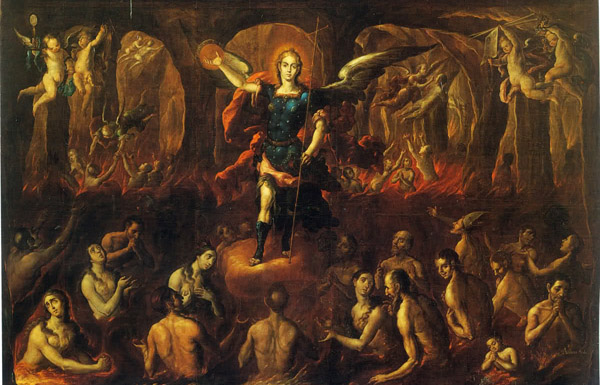A quick posting...
While most Catholics simply do not believe in Purgatory, it seems that there are some who simply do not understand the two-fold reasoning behind this teaching of the Church.
And, yes, it still is a teaching.
First of all, in the CCC, we read this and let me comment in blue:
III. THE FINAL PURIFICATION, OR PURGATORY
1030 All who die in God's grace and friendship, but still imperfectly purified, are indeed assured of their eternal salvation; but after death they undergo purification, so as to achieve the holiness necessary to enter the joy of heaven.
So, the first reason given in the Catechism is that purgation of sin and imperfections is necessary before one goes to heaven. "Only the perfect see God." If we allow God, or if it is God's will that we experience purgation on earth, so much the better, as then, we gain more merit for heaven.
1031 The Church gives the name Purgatory to this final purification of the elect, which is entirely different from the punishment of the damned.606 The Church formulated her doctrine of faith on Purgatory especially at the Councils of Florence and Trent. The tradition of the Church, by reference to certain texts of Scripture, speaks of a cleansing fire:607
- As for certain lesser faults, we must believe that, before the Final Judgment, there is a purifying fire. He who is truth says that whoever utters blasphemy against the Holy Spirit will be pardoned neither in this age nor in the age to come. From this sentence we understand that certain offenses can be forgiven in this age, but certain others in the age to come.608
- Let us help and commemorate them. If Job's sons were purified by their father's sacrifice, why would we doubt that our offerings for the dead bring them some consolation? Let us not hesitate to help those who have died and to offer our prayers for them.611
That temporal punishment is due to sin, even after the sin itself has been pardoned by God, is clearly the teaching of Scripture. God indeed brought man out of his first disobedience and gave him power to govern all things (Wisdom 10:2), but still condemned him "to eat his bread in the sweat of his brow" until he returned unto dust. God forgave the incredulity of Moses and Aaron, but in punishment kept them from the "land of promise" (Numbers 20:12). The Lord took away the sin of David, but the life of the child was forfeited because David had made God's enemies blaspheme His Holy Name (2 Samuel 12:13-14). In the New Testament as well as in the Old, almsgiving and fasting, and in general penitential acts are the real fruits of repentance (Matthew 3:8; Luke 17:3; 3:3). The whole penitential system of the Church testifies that the voluntary assumption of penitential works has always been part of true repentance and the Council of Trent (Sess. XIV, can. xi) reminds the faithfulthat God does not always remit the whole punishment due to sin together with the guilt. God requires satisfaction, and will punish sin, and this doctrine involves as its necessary consequence a belief that the sinner failing to do penance in this life may be punished in another world, and so not be cast off eternally from God. from the CE
- Would it not easier, and would we not gain more merit in heaven for accepting purgatory on earth, both as punishment and purification? This would mean doing penance now.
